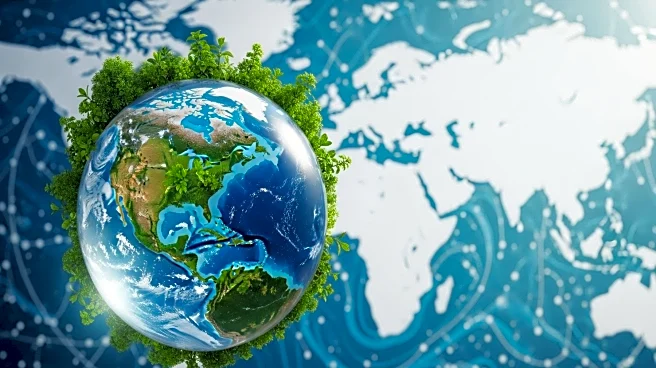What's Happening?
The European Union's Climate Commissioner, Wopke Hoekstra, has expressed concern over the United States' absence from global climate initiatives. During a United Nations meeting, over a hundred countries committed to new plans to reduce pollution by 2035. However, the U.S. remains a significant holdout, with President Trump dismissing climate change as a 'con job' and green policies as a scam. Hoekstra emphasized the importance of collective global action to address the worsening climate crisis, noting the economic and geopolitical impacts. He highlighted the EU's ambitious targets to reduce emissions by up to 72.5% compared to 1999 levels, positioning the EU as a leader in climate action.
Why It's Important?
The absence of the U.S. in global climate discussions is a major setback for international efforts to combat climate change. As the world's largest economy and second-largest emitter, U.S. participation is crucial for effective global action. Hoekstra noted that American leadership is vital in addressing climate issues, and its absence complicates negotiations with other major emitters like China. The EU's commitment to significant emission reductions underscores the urgency of transitioning to a decarbonized economy, which is increasingly seen as essential for long-term business survival. The economic implications of climate change, including droughts and wildfires, are becoming more severe, necessitating immediate action.
What's Next?
The EU is working to eliminate its dependency on Russian gas, which poses challenges to its climate and broader policy goals. Hoekstra acknowledged the difficulty of this transition but emphasized the need to eradicate this dependency. The EU has already reduced its reliance on Russian gas by 90%, with efforts ongoing to address the remaining 10%. The focus is on facilitating job transitions for workers in industries affected by climate policies, ensuring they have access to new opportunities in emerging sectors. The EU's leadership in climate action may influence other nations to adopt more ambitious targets, despite the U.S. stance.
Beyond the Headlines
The broader implications of the U.S. absence in climate discussions include potential shifts in global power dynamics, as other nations may step up to fill the leadership void. The EU's proactive approach could strengthen its geopolitical influence, particularly in climate diplomacy. The transition to a decarbonized economy presents ethical challenges, such as ensuring equitable access to new job opportunities and addressing the concerns of communities reliant on fossil fuel industries. The rapid decline in solar energy costs highlights the commercial viability of clean energy, which could drive further investment and innovation in the sector.









